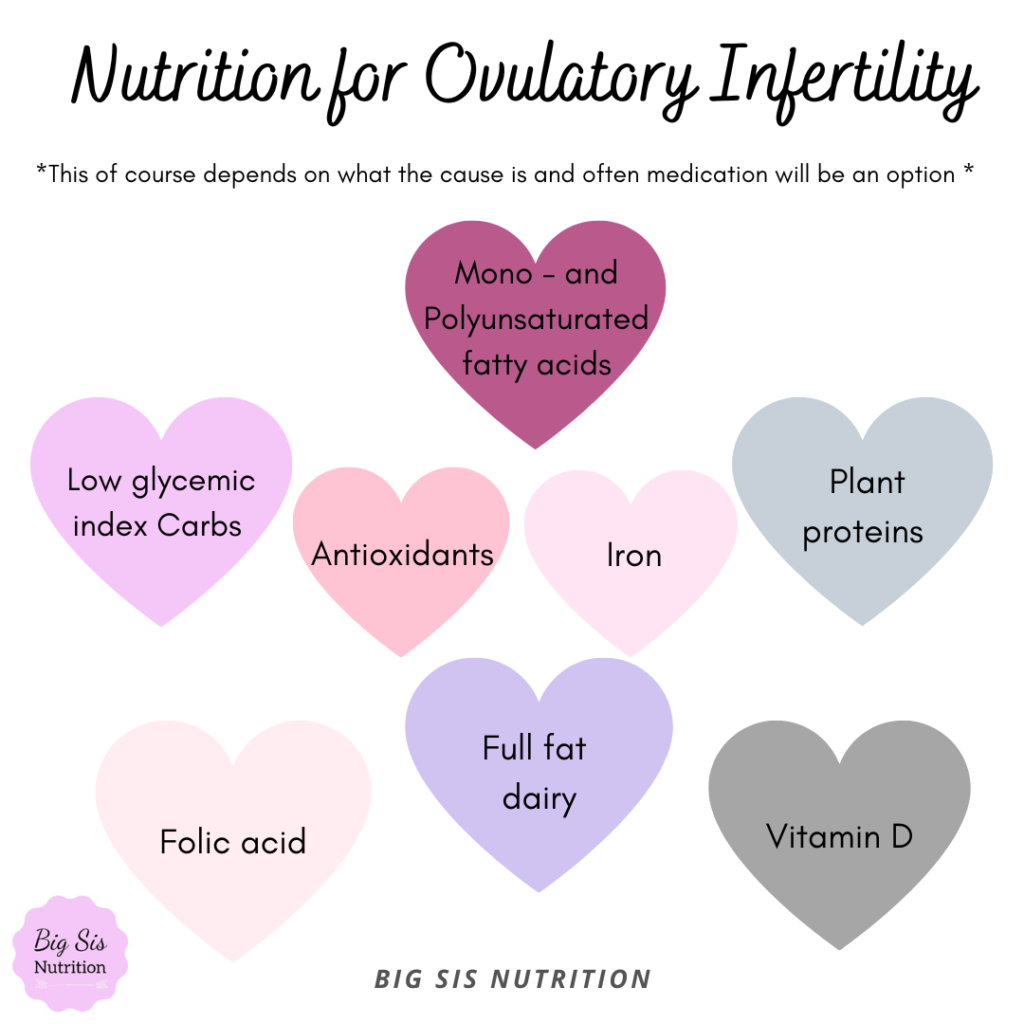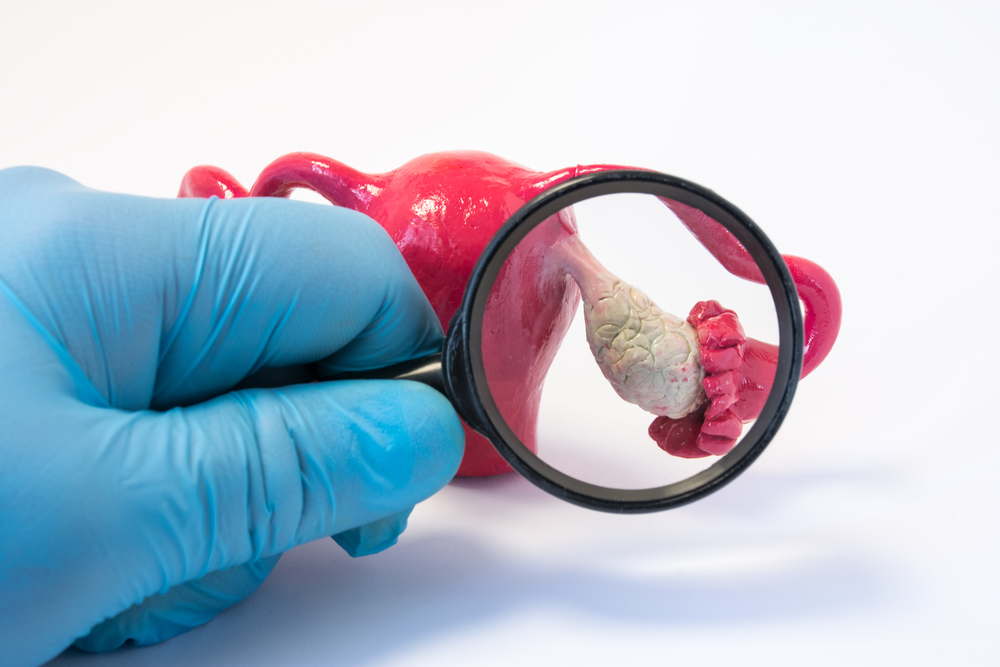Ovulatory Dysfunction is defined as ovarian issues that interfere with maturation or correct release of the egg. This is characterised by irregular periods, or less than 9 menstrual periods yearly or absent ovulation. There are several conditions that contribute to ovulatory dysfunction, and these include:
- Hypothalamic Amenorrhea
- Hyperprolactinemia
- Hormonal medications
- Stress
- Diabetes
- Thyroid dysfunction
- Primary Ovarian Insufficiency
- Perimenopause
- PCOS
Ovulatory dysfunction is the most common cause of female infertility, accounting for up to 40% of struggles. There are MANY causes of ovulatory dysfunction which is why it is so important that it is investigated and managed earlier rather than later. Knowledge is power as they say, and it truly is great having control and power over your fertility. Depending on the cause of ovulatory dysfunction, nutrition can often play a role in helping. For conditions such as PCOS, hypothalamic amenorrhea, diabetes and thyroid issues, nutrition can make a significant difference.
The most common ovulatory dysfunction disorder is PCOS. September marks PCOS awareness month. PCOS (Polycystic Ovary Syndrome) is thought to affect 8-13% of women worldwide, and it is estimated that 80% of these women with PCOS will experience issues with conception.
In those with PCOS, the body has an imbalance of insulin and androgens (male type hormones). The higher circulating levels of these hormones is responsible for many of the symptoms of PCOS. The proposed mechanism behind this is that the increased levels of insulin in the body cause the ovaries to work differently and produce extra androgens. Theoretically if we can balance insulin levels, and androgen levels, we can manage the symptoms.
How exactly does this affect the ovaries?
The eggs inside the ovaries, are unable to develop to maturity, so they are not released, and ovulation does not occur, making it more difficult to fall pregnant.
There is no way to determine what causes PCOS or how to prevent it from developing. The only one risk factor is if you have an immediate female relative who has PCOS.
Some of the main symptoms of PCOS include:
- Irregular periods
- Excess hair growth (body hair, and facial hair).
- Hair loss
- Difficulty with weight loss, or unexplained weight gain
- Acne
- Mood changes (such as anxiety and depression)
- Fatigue
Everyone’s presentation with PCOS will look different. It is important that women are managed with PCOS, as having less than 4 periods a year can lead to endometrial hyperplasia (basically overgrown endometrial lining), which increases the risk of endometrial cancer.
Those with PCOS are also at an increased risk of long term chronic health conditions such as:
- Type 2 diabetes
- Cardiovascular disease
- High cholesterol levels
- Sleep apnoea
A key issue for those with PCOS is insulin resistance, as 85% of all women with PCOS are insulin resistant. This is one of the key criteria that can be improved with diet and lifestyle.
Read more about the importance of nutrition in pregnancy
Why is nutrition so important for ovulatory disorders and PCOS?
The research is strong and firm in confirming that closely following a “fertility type” dietary pattern is associated with a reduced presence of ovulatory dysfunction infertility. One study showed that a combination of lifestyle factors (diet, weight, and physical activity) was associated with a 69% lower risk of ovulatory dysfunction. This study also concluded that most cases of infertility due to ovulatory dysfunction can be improved through diet and lifestyle. For those who have undergone any assisted reproductive technologies, this news can be a welcome reminder that sometimes our most powerful tools are the simple ones!

What are the key principles of diet for falling pregnant with PCOS?
The amazing thing about eating for fertility and PCOS, is that it centres on your classic healthy eating or healthy diet principles. The only difference is that it really focuses on specific nutrients and patterns.
What dietary approaches can we take to PCOS?
1. Get into routine
Eat regular meals and snacks (ideally 3 main meals, and 2-3 snacks daily), that include a variety of foods, with a balance of protein, fats and carbohydrates.
2. Make friends with carbohydrates
Focus on low GI (glycaemic index) carbs such as wholegrain bread, wholemeal pasta, brown rice, quinoa, popcorn and oats. The glycaemic index refers to the impact a food has on raising blood glucose levels, and the speed that it occurs.
3. Fats are friends
Have meals that include unsaturated fats such as avocado, extra virgin olive oil, oily fish (high in omega 3 fatty acids) and nuts & seeds. Unsaturated fats are anti-inflammatory which can assist with egg quality, and an improved uterine lining which is perfect for conception!
4. Go for it with fruits and vegetables
Load up on fresh vegetables and fruit. As a ratio, aim for half of your meal to consist of vegetables.
5. Don’t ditch the dairy
Include two serves of full fat dairy in your diet, as research has shown this contributes to improved ovulation regularity, where low fat dairy was associated with an increased risk of ovulatory infertility. Funny how the science comes out! It is hard to say whether this was due to the dairy type specifically, or other factors in the study participants diets.
6. Build your team
This one is the final tip, and a very important one! Every person who is planning a pregnancy, struggling with PCOS, or ovulatory infertility should see a prenatal dietitian for tailored advice and supplementation.
Doing it all on your own can be tough, and so confusing when you look at everyone’s conflicting opinions. Having a specialized dietitian there to guide you can ensure that you feel confident in managing your condition and falling pregnant sooner!
Read more here about improving egg quality
If you would like some nutrition support in achieving pregnancy with ovulatory infertility, book here for our Preconception Pro package, or an initial consultation.


